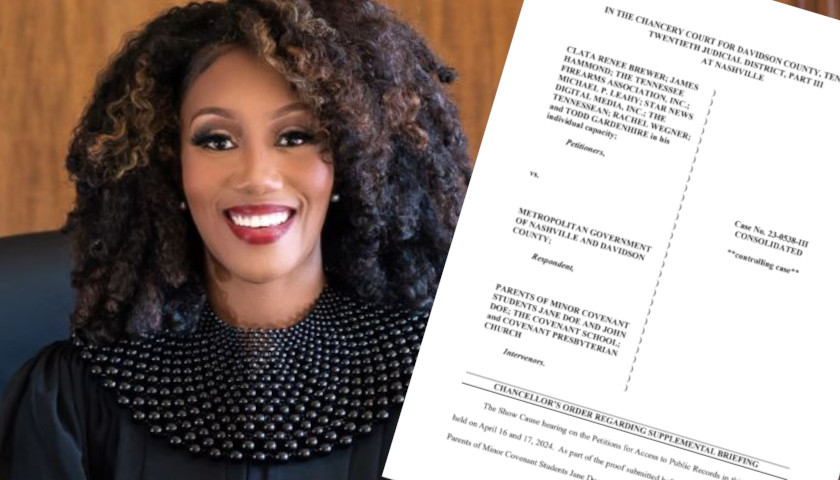Live from Music Row Thursday morning on The Tennessee Star Report with Michael Patrick Leahy – broadcast on Nashville’s Talk Radio 98.3 and 1510 WLAC weekdays from 5:00 a.m. to 8:00 a.m. – host Leahy welcomed all-star panelist Clint Brewer in-studio to untangle the current SB2616 as proposed by Senator Frank Niceley, which would require state primary election candidates to have three-year residency in the state of Tennessee to get on the ballot.
Leahy: In-studio with our good friend, all-star panelist, and recovering journalist, Clint Brewer. Now we are in political-geek heaven (Brewer laughs) right now, you and I, Clint.
And I can tell you, I know there are a lot of people in this listening audience who are hanging on every word, because we’re giving them information about the 5th Congressional District race here in Tennessee.
They can’t get it anywhere else because nobody else is actually doing any investigative journalism on it. So we talked in the first part, just to summarize, there are two paths to get on the ballot for, let’s call them, generously, the new arrivals, Morgan Ortagus, and –
Brewer: That’s very diplomatic of you.
Leahy: I’m a diplomatic guy. (Chuckles)
Brewer: That’s what everyone says about you.
Leahy: (Chuckles) – and Robby Starbuck Newsom. They’re trying to get on the ballot. New arrivals here in Tennessee. We first talked about the existing law, the Tennessee Republican Party, bylaws. It looks like, by those standards, Robby Starbuck really doesn’t have that much of a chance to get on.
Brewer: It doesn’t look good.
Leahy: It doesn’t look good for him. And Morgan Ortagus may have a better chance, it looks like, on that standard.
Brewer: Yeah, exactly.
Leahy: Because she could, depending on how you read it, and because she lived in New York, where they literally didn’t have statewide primaries in 2014, 2018, she could meet the three-out-of-four standard.
Brewer: And then you get before the subcommittee of the state executive committee. I think the decision there can be a little feel involved.
Leahy: I think feel is involved.
Brewer: It’s sort of like, well, she served in the Trump administration and the former president has endorsed her. Some of the grayer parts of her record, and grayer parts of the law, frankly – does that sort of opaqueness work in her favor …
Leahy: Bylaws, actually.
Brewer: … given her track record of being in the Trump administration? I think that you put all those facts together and put her service record together, and her support and where it comes from, makes it hard for them to push those facts into one column or the other.
Leahy: The other path that you got to get over is the SB2616, which requires Tennessee residency prior to 2019.
Brewer: This is the new law.
Leahy: The new bill.
Brewer: The new bill. It’s not a law yet.
Leahy: It’s a bill that sailed through, sponsored by State Senator Frank Niceley, sailed through in a 5-1 vote in the State and Local committee on Tuesday, and is likely to sail through on a floor vote in the state Senate.
Then it goes to the House. It looks pretty good there as well. And then if it’s passed by both chambers – Governor Lee, if [he] were to veto it, you just need a majority over that veto. It looks to me like this has got a good shot at becoming law.
Then the challenge becomes one of constitutionality – asterisk – we’ll get to that in a minute. What does it say? Here’s exactly what the bill says: “In order to qualify as a candidate in a primary election for the United States Senate or for a member of the U.S. House of Representatives, a person shall meet the residency requirements for state senators and representatives contained in the Tennessee Constitution.”
That’s three years of residency. Notice, in order to qualify as a candidate in a primary election, that date, April 7th. That’s the filing deadline for your petitions. And we talked to the sponsor yesterday, and here’s what he said.
‘The state Senator, Frank Niceley, from Strawberry Plains, just past Knoxville, “SB 2616 would require the establishment of state residency in Tennessee prior to April 7th, 2019, in order to be on the August 2022 primary ballot.”
This law goes into effect immediately. The odds that this bill becomes law before the end of this session, I think, are pretty good right now.
Brewer: When you say it goes into effect immediately, typically there’s a lag time between when they’re passed.
Leahy: Typically
Brewer: And when the governor signs them.
Leahy: It’s a 10-day period.
Brewer: Or doesn’t.
Leahy: 10 days, effectiveness.
Brewer: Effectiveness.
Leahy: Yes. This specifically says it goes immediately into effect.
Brewer: A lot of times they don’t go in effect until the start of the new fiscal year, or June.
Leahy: Yes. They specifically wrote immediately.
Brewer: Setting aside the Xs and Os of getting over these challenges, I think the most fascinating part of this is it runs so contrary to the national narrative that former President Trump has this sort of mystical death-lock on the Republican party.
Leahy: I like that phrase, mystical death-lock.
Brewer: The national political report is they make it sound like he’s got this sort of voodoo enchantment over every Republican official in the country. Clearly, that’s not the case in Tennessee.
Leahy: Not at all.
Brewer: All of these actions fly in the face of the former president’s endorsement.
Leahy: Exactly. And I can tell you that there is huge sentiment in the Tennessee General Assembly in favor of this bill passing into law because now it’s an interesting dichotomy. Almost all of them support the president’s policies as president.
Brewer: And would support the president again if he runs.
Leahy: His ratings, if he runs, are like 90 percent –
Brewer: Absolutely.
Leahy: – among Tennessee Republican primary voters. And I think if we did a poll today, they still are. But when it comes to telling Tennesseans who they should elect as representative in the House of Representatives, Tennesseans don’t want to hear from the president. They don’t want him to impose his will on them.
Brewer: Just in case there are any, what was the word you used before? New arrivals?
Leahy: New arrivals.
Brewer: So in case there are any new arrivals puzzled by all this, as a person born and raised Tennessean I will tell you, we can be a little contrary.
Leahy: We certainly can.
Brewer: Just a little – actually, a lot.
Leahy: Politely contrary.
Brewer: Yes. Or not. (Laughter) This is kind of who the state actually is.
Leahy: It’s exactly right. It’s exactly right.
Brewer: People here do not like being told what to do.
Leahy: Don’t like it at all. Mr. Trump. Former President Trump, I hope you’re listening to that point.
Brewer: I’m going to make this point again. I don’t know if you disagree with me. This is where we diverge sometimes on this topic.
Leahy: Diverge.
Brewer: I’m going to make the point again. As somebody in the 5th District, I don’t know all these legal machinations, whether Morgan Ortagus can qualify for the ballot or not. I will say that she is, when I use this word, I don’t mean legally qualified.
She is a very qualified person to serve in Congress. And looking at her track record of public service, her education, her work history, I would be excited about the debate we would have in the district about representing the 5th if she were in. I’ll say this, too. I think if Ms. Ortagus is out, I’m just going to say it. I think that Andy Ogles is a really strong candidate. Really strong.
Leahy: Mayor of Maury County.
Brewer: I’m telling you.
Leahy: Longtime history.
Brewer: I’ll stop short of calling him the presumptive frontrunner if he gets in. But, I mean, he’s got a whole county. He’s got a long track record of conservative activism here.
Leahy: 25, 30 years.
Brewer: So if Ms. Ortegas is off the board, I think Mayor Ogles has a really strong case. I’ll also say that Baxter Lee has a remarkably strong campaign team.
Leahy: Chip Saltsman – by the way, though, I just got to tell you, he may not meet the standard to qualify because he voted in the 2020 Democratic presidential primary.
Brewer: Interesting.
Leahy: So he’s only two for four. So he’s going to have a challenge. He’ll be challenged.
Brewer: If we challenge the first one, we might start challenging all down the line.
Leahy: Oh, they’re all going to be challenged.
Brewer: Right. Chip Saltsman has got a really strong record of getting members of Congress elected.
Leahy: Baxter Lee has also told us on this program that he’s willing to spend $3 million to get on the ballot. And Beth Harwell, too.
Brewer: Yes. Once these sort of parliamentary, I don’t know if that’s the right word, procedural questions are cleared up about the ballot, I think Tennesseans, and particularly those in the 5th District, need to understand there are still some really strong candidates sitting in the background waiting to see how this shakes out.
Leahy: Exactly. Now, the other part about this is, if this bill becomes law, and you have to have been a resident of Tennessee for three years before getting on the primary ballot, the law does not prohibit somebody from running as an Independent in the general election. That’s a very strategic decision.
Brewer: And a difficult one.
Leahy: But it’s strategic. It would be difficult to do. But by that standard, Morgan Ortagus would absolutely not qualify. And so if that law passes, to get on the ballot, she would have to sue the state of Tennessee in federal court.
Not exactly a good look. But I’m just saying that’s what she’d have to do, if it passes. Robby Starbucks, on the other hand, probably doesn’t meet this standard. He wouldn’t have registered to vote here until three months after.
And by his own words, he said he wasn’t a full-time resident of the state until after August 2020. That’s an interview he gave to another radio station in town. So that’s going to be tough for him as well.
Brewer: Absolutely.
Leahy: Are we in the weeds enough?
Brewer: We are.
Leahy: But it’s fascinating!
Brewer: It’s fascinating!
– – –
Tune in weekdays from 5:00 – 8:00 a.m. to The Tennessee Star Report with Michael Patrick Leahy on Talk Radio 98.3 FM WLAC 1510. Listen online at iHeart Radio.
Photo “Robby Starbuck” by Robby Starbuck.









You all are the only ones doing investigative journalism? Come on …
All of these articles are purely non biased journalist investigation?
In that case, investigate each candidate equally as most of us know that these two are not the only TN Newcomers who are declared, FEC filed candidates in the GOP Primary for the 5th.
Investigate a little more and each candidate equally v. targeting specific candidates.